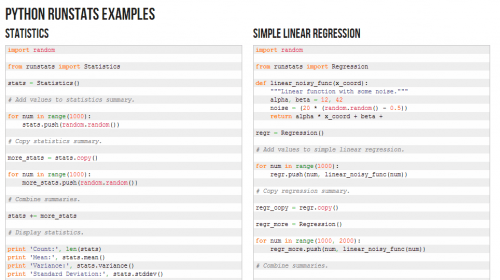Python runstats Module: Collect running statistics and regression in a single pass of data.
Features and benefits:
- Statistics summary computes arithmetic mean, variance, standard deviation, skewness, and kurtosis.
- Regression summary computes slope, intercept, and correlation.
- Based on the Knuth and Welford method for computing standard deviation in one pass as described in the Art of Computer Programming, Vol 2, p. 232, 3rd edition.
- Numerically stable and accurate.
- Supports combining summary objects with + and += operators.
- Requires only one pass of the discrete data points. Alternatively, can efficiently provide running statistics and regression.
- Install Python runstats from PyPI
- Fork Python runstats on Github
- Read the Docs for Python runstats
Python runstats Examples
Statistics
import random from runstats import Statistics stats = Statistics() # Add values to statistics summary. for num in range(1000): stats.push(random.random()) # Copy statistics summary. more_stats = stats.copy() for num in range(1000): more_stats.push(random.random()) # Combine summaries. stats += more_stats # Display statistics. print 'Count:', len(stats) print 'Mean:', stats.mean() print 'Variance:', stats.variance() print 'Standard Deviation:', stats.stddev() print 'Skewness:', stats.skewness() print 'Kurtosis:', stats.kurtosis() |
Simple Linear Regression
import random from runstats import Regression def linear_noisy_func(x_coord): """Linear function with some noise.""" alpha, beta = 12, 42 noise = (20 * (random.random() - 0.5)) return alpha * x_coord + beta + regr = Regression() # Add values to simple linear regression. for num in range(1000): regr.push(num, linear_noisy_func(num)) # Copy regression summary. regr_copy = regr.copy() regr_more = Regression() for num in range(1000, 2000): regr_more.push(num, linear_noisy_func(num)) # Combine summaries. regr = regr_copy + regr_more # Display regression values. print 'Count:', len(regr) print 'Slope:', regr.slope() print 'Intercept:', regr.intercept() print 'Correlation:', regr.correlation() |
Installation
Available for install from PyPI:
pip install runstats
|
Credits
Based entirely on the C++ versions by John Cook:
License
Copyright 2015 Grant Jenks Licensed under the Apache License, Version 2.0 (the "License"); you may not use this file except in compliance with the License. You may obtain a copy of the License at http://www.apache.org/licenses/LICENSE-2.0 Unless required by applicable law or agreed to in writing, software distributed under the License is distributed on an "AS IS" BASIS, WITHOUT WARRANTIES OR CONDITIONS OF ANY KIND, either express or implied. See the License for the specific language governing permissions and limitations under the License. |
